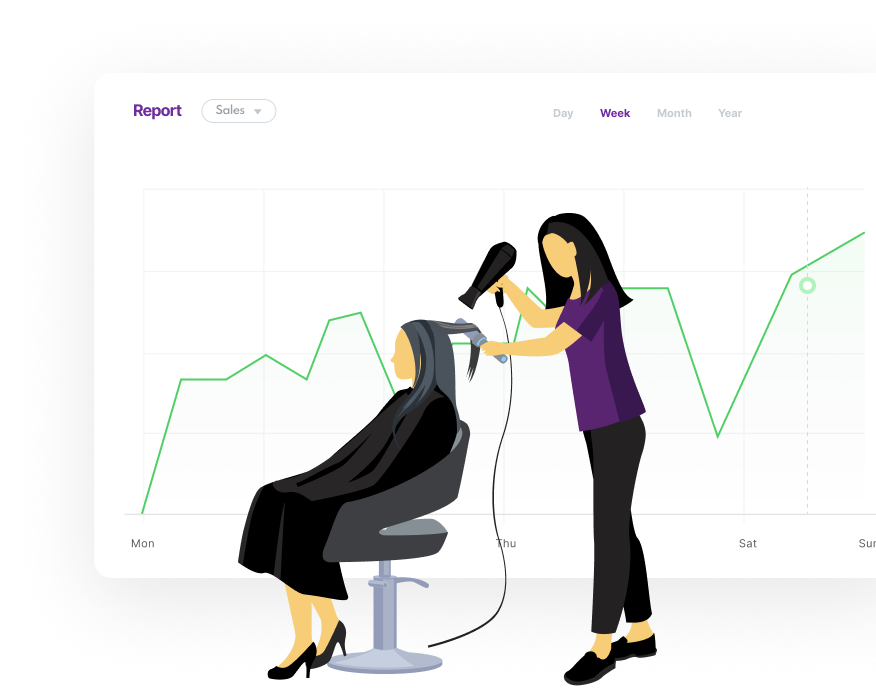On the other hand, a commission-based salon employs stylists who earn a percentage of the revenue they generate from their services. In this model, the salon owner covers expenses, such as rent, utilities, and supplies, while providing a more structured work environment and support for the stylists.
In this comprehensive guide, we will examine the advantages and disadvantages of booth rental and commission-based salons for salon owners and stylists. The decision-making process will be influenced by personal and professional objectives, financial stability, risk tolerance, and the desired work environment and support structures. Through a thorough understanding of each model, salon owners and stylists can make well-informed decisions that enhance their potential for success and satisfaction in the beauty industry.
Pros of Booth Rental
More freedom for stylists:
- Independently determine pricing, products, and services: Booth rental salons grant stylists complete control over their business decisions, such as service pricing, product selection, and service customization based on skills and interests.
- Unleash creativity through techniques and styles: Greater independence empowers stylists to explore innovative techniques and styles without constraint from salon owner preferences or policies.
Potential for increased earnings:
- Retain a larger share of service fees: Booth rental allows stylists to keep all earnings from services, minus the rental fee, potentially resulting in higher income compared to commission-based models.
- Profit from retail sales: Booth renters can supplement their income by selling retail products to clients, diversifying their revenue sources.
Flexible scheduling and service offerings:
- Establish working hours: Booth rental stylists can create their own schedules, promoting a healthy work-life balance by choosing working hours, days off, and vacations without requiring salon owner approval.
- Cater to niche markets or specialized services: Booth renters can provide niche or specialized services unavailable in commission-based salons, attracting a specific clientele and distinguishing their business from competitors.
Simplified personal brand development:
- Implement targeted marketing strategies: Booth renters can devise personalized marketing and promotional campaigns to reach ideal clients and showcase unique talents, fostering a robust personal brand.
- Cultivate a loyal customer base: By offering customized services and nurturing client relationships, booth renters can build a loyal clientele that will continue to patronize their services and refer others, contributing significantly to long-term business success.
Cons of Booth Rental
Heightened responsibility for expenses:
- Cover Rent, Utilities, And Maintenance Costs: Booth renters must manage expenses such as rent, utilities, and maintenance, requiring careful budgeting and financial planning.
- Invest In Equipment And Products: Stylists in booth rental models must bear the upfront cost of equipment and products, manage inventory, and ensure they have adequate supplies for their services.
Reduced stability and security:
- Unpredictable income: Booth renters' earnings can fluctuate significantly, causing financial stress and making long-term planning difficult
- No employee benefits or insurance: Independent contractors must arrange their own health insurance, retirement plans, and other benefits, which can be costly and time-consuming.
Limited salon owner support:
- Restricted access to marketing resources: Booth renters might not have access to salon marketing resources and must create and fund their marketing efforts independently, which can be challenging for newcomers.
- Minimal guidance and mentorship: Stylists in booth rental models often receive limited support from salon owners, potentially hindering growth and skill development, especially for those starting their careers.
Potential isolation from colleagues:
- Diminished collaboration and networking opportunities: Booth renters may miss out on the collaborative environment of commission-based salons, limiting networking, idea sharing, and learning from peers.
- Restricted skill development and training opportunities: Stylists in booth rental models must independently seek training and may lack access to educational resources or workshops available in commission-based salons, potentially impeding industry growth.
Pros of Commission-Based Salons
Enhanced stability and security for stylists:
- Consistent income: Commission-based salon stylists receive a percentage of the revenue they generate, providing a more stable income compared to booth rental models, offering financial security and peace of mind.
- Employee benefits and insurance: Stylists in commission-based salons may receive benefits such as health insurance, paid time off, and retirement plans, adding value to their compensation and providing a safety net for unexpected events.
Financial support for expenses and overhead:
- Salon owner covers rent, utilities, and maintenance: In commission-based models, salon owners handle expenses like rent, utilities, and maintenance, allowing stylists to focus on their work.
- Provided equipment and products: Commission-based salons typically supply stylists with necessary equipment and products, saving money and time compared to booth renters who manage their inventory.
Collaborative team environment:
- Learn from colleagues: Commission-based salons foster a supportive and collaborative work environment where stylists can learn from each other, share ideas, and gain advice from experienced peers.
- Benefit from stylist and management support: Stylists in commission-based salons receive guidance and support from both colleagues and management, helping them develop skills and advance professionally.
Access to salon marketing and clientele:
- Participate in-salon promotions and advertising: Commission-based salon stylists can benefit from the salon's marketing efforts, such as advertising campaigns and promotional events, attracting new clients and increasing income.
- Tap into existing client base: Commission-based salons often have an established clientele, providing stylists with a consistent flow of clients and enabling them to build their client base more quickly than in booth rental models.
Cons of Commission-Based Salons
Reduced autonomy and control for stylists:
- Salon owner sets pricing, products, and services: In commission-based salons, salon owners control pricing, product selection, and services, limiting a stylist's ability to make independent decisions and customize their offerings.
- Constrained creative freedom: Stylists in commission-based salons may have limited creative freedom due to adherence to the salon owner's preferences or policies, restricting their exploration of new techniques and styles.
Potentially lower earnings:
- Commission split with salon owner: Commission-based stylists share a portion of their service fees with the salon owner, potentially resulting in lower earnings compared to booth renters who retain all fees, minus rental costs.
- Fewer retail sales opportunities: Stylists in commission-based salons may have limited chances to profit from retail sales, as the salon owner often manages and benefits from these sales.
Limited scheduling and service flexibility:
- Set working hours and shifts: Commission-based salons typically have fixed working hours and shifts, restricting a stylist's ability to control their schedule and balance work and personal life.
- Restricted specialized or niche services: Stylists in commission-based salons may have limited options for offering specialized or niche services, as salon owners may prioritize a specific range of broadly appealing services, potentially constraining a stylist's ability to cater to niche markets or showcase unique talents.
Challenges in building a personal brand:
- In-salon competition: Commission-based salon stylists may face competition from colleagues for clients and recognition, making it more challenging to establish a strong personal brand.
- Limited marketing control: Stylists in commission-based salons typically have less control over marketing efforts, as salon owners manage promotions and advertising, making it more difficult for stylists to create targeted marketing campaigns and attract ideal clients.
Factors to consider when choosing a salon model

- Personal and professional goals: Stylists should weigh their career aspirations and preferred work environment when deciding between booth rental and commission-based models. Booth rentals offer greater autonomy and creative freedom, while commission-based salons provide more stability and support from the salon owner.
- Financial stability and risk tolerance: A stylist's financial stability and willingness to assume risks associated with running a business will influence their choice between these models. Booth rentals can potentially yield higher earnings but come with increased responsibility for expenses, while commission-based models offer a more steady income and cover various expenses such as rent, utilities, and maintenance.
- Desired work environment and support structure: The level of support and collaboration a stylist seeks will significantly impact their decision. Commission-based salons often foster a team environment with opportunities to learn from colleagues and receive guidance from management, while booth rentals provide more independence but may lack the same level of support and collaboration.
Importance of Aligning with Personal & Professional Goals
- Making well-informed decisions: Thoroughly understanding the pros and cons of booth rental and commission-based salons enables stylists to make informed decisions that align with their goals and preferences. For example, those seeking independence and higher earning potential may prefer booth rentals, while those looking for stability and support may opt for commission-based salons.
- Maximizing potential for success and satisfaction:Selecting the right salon model plays a crucial role in a stylist's overall success and satisfaction in the beauty industry. Carefully considering the options helps ensure a fulfilling and prosperous career, whether that entails thriving in a more autonomous booth rental environment or benefiting from the structured support of a commission-based salon.
